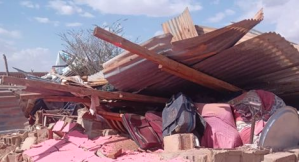
Authorities in Sudan on July 8 demolished a church complex in Khartoum North, sources said. With no prior warning, bulldozers and trucked accompanied by police and armed forces personnel arrived at the compound of the Pentecostal Church in the El-Haj Yousif area of East Nile District at noon and began demolishing the church building, sources told local media.
Officials initially gave no reason for demolishing the building, which included a worship hall and administrative offices, sources said.
“It was shocking,” one eyewitness reportedly said.
The church, which belongs to the Sudan Pentecostal Church denomination (SPC), constructed the building in the early 1990s, according to Christian Solidarity Worldwide (CSW). Christians have called on the Sudan Council of Churches, an ecumenical body, to take notice of the religious freedom violation.
Officials reportedly did not ask for ownership papers of the church building before demolishing it.
Authorities later told church officials the building was destroyed as part of a drive to remove “unregulated” buildings throughout Khartoum state, according to Christian support group Open Doors.
“Last month, Rafat Samir, a church leader and the chairman of the Evangelical Community Council for Sudan, warned that the future of the church in Sudan remains precarious under the SAF’s de facto government,” Open Doors reported. “‘They will target all churches in the outlying areas of the main cities and demolish them with a direct attack,’ he said after last week’s incident. ‘As for the large churches within the city centers, they will target them by using other apparently lawful reasons to destroy the church buildings.’”
Church leaders condemned the destruction, describing it as part of an increase in persecution against Christians in Sudan.
“We urge all Christians to pray so that this strengthens us in this persecution, and pray for the church in Sudan,” area pastor Juma Sapana stated on his Facebook page.
The demolition comes after the Sudanese Armed Forces (SAF) in May declared it had liberated Khartoum from the paramilitary Rapid Support Forces (RSF) with which it has been locked in battle since April 15, 2023, though fighting continues in neighboring Omdurman. Both the SAF and the RSF have attacked places of worship since then.
Sudan was ranked No. 5 among the 50 countries where it is most difficult to be a Christian in Open Doors’ 2025 World Watch List (WWL), down from No. 8 the prior year.
Conditions in Sudan worsened as civil war that broke out in April 2023 intensified. Sudan registered increases in the number of Christians killed and sexually assaulted and Christian homes and businesses attacked, according to the WWL report.
“Christians of all backgrounds are trapped in the chaos, unable to flee. Churches are shelled, looted and occupied by the warring parties,” the report stated.
Both the RSF and the SAF are Islamist forces that have attacked displaced Christians on accusations of supporting the other’s combatants.
The conflict between the RSF and the SAF, which had shared military rule in Sudan following an October 2021 coup, has terrorized civilians in Khartoum and elsewhere, killing tens of thousands and displacing more than 11.9 million people within and beyond Sudan’ borders, according to the U.N. Commissioner for Human Rights (UNCHR).
The SAF’s Gen. Abdelfattah al-Burhan and his then-vice president, RSF leader Mohamed Hamdan Dagalo, were in power when civilian parties in March 2023 agreed on a framework to re-establish a democratic transition the next month, but disagreements over military structure torpedoed final approval.
Burhan sought to place the RSF – a paramilitary outfit with roots in the Janjaweed militias that had helped former strongman Al-Bashir put down rebels – under the regular army’s control within two years, while Dagolo would accept integration within nothing fewer than 10 years.
Both military leaders have Islamist backgrounds while trying to portray themselves to the international community as pro-democracy advocates of religious freedom.
Sudan had dropped out of the top 10 of the WWL list for the first time in six years when it first ranked No. 13 in 2021.
Following two years of advances in religious freedom in Sudan after the end of the Islamist dictatorship under Bashir in 2019, the specter of state-sponsored persecution returned with the military coup of Oct. 25, 2021. After Bashir was ousted from 30 years of power in April 2019, the transitional civilian-military government had managed to undo some sharia (Islamic law) provisions. It outlawed the labeling of any religious group “infidels” and thus effectively rescinded apostasy laws that made leaving Islam punishable by death.
With the Oct. 25, 2021 coup, Christians in Sudan feared the return of the most repressive and harsh aspects of Islamic law.
The U.S. State Department in 2019 removed Sudan from the list of Countries of Particular Concern (CPC) that engage in or tolerate “systematic, ongoing and egregious violations of religious freedom” and upgraded it to a watch list. Sudan had previously been designated as a CPC from 1999 to 2018.
In December 2020, the State Department removed Sudan from its Special Watch List.
The Christian population of Sudan is estimated at 2 million, or 4.5 percent of the total population of more than 43 million.





